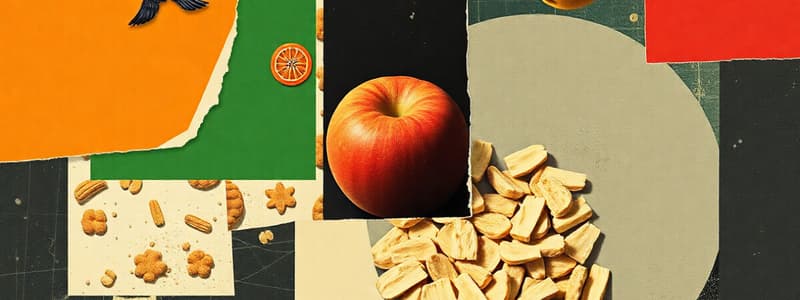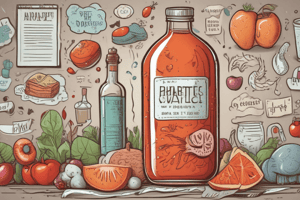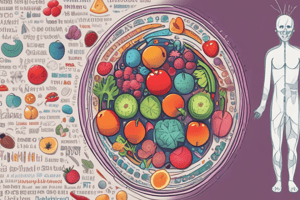Podcast
Questions and Answers
What is the central paradox the author identifies within modern medicine, particularly concerning nutrition?
What is the central paradox the author identifies within modern medicine, particularly concerning nutrition?
- Medical professionals often need to discard outdated practices, but lack foundational nutritional education. (correct)
- Physicians readily embrace new pharmaceutical advancements while disregarding established surgical techniques.
- Modern medicine excels in treating acute illnesses but neglects preventative care.
- There is an over-reliance on complex diagnostic tools while basic examination skills are ignored.
Why did the author describe their experience in modern medicine as being 'part of that racket'?
Why did the author describe their experience in modern medicine as being 'part of that racket'?
- The author was involved with insurance fraud during their 40 years of practice.
- The author felt exploited by the hospital administration due to low academic pay.
- The author believed the system prioritized profits and pharmaceutical influence over optimal patient care. (correct)
- The author regretted focusing on academic medicine rather than private practice.
What was the primary conflict between the author and the UCSF Pediatric Diabetes Clinic's dietitian?
What was the primary conflict between the author and the UCSF Pediatric Diabetes Clinic's dietitian?
- The dietitian promoted a high-carbohydrate diet for diabetic children, while the author advocated for carbohydrate restriction. (correct)
- The author believed in aggressive insulin therapy, while the dietitian preferred lifestyle interventions alone.
- The dietitian specialized in type 1 diabetes, while the author focused on type 2.
- The dietitian was in charge of outpatient care, while the author focused on inpatient care.
What was the author's hypothesis regarding type 1 diabetes management?
What was the author's hypothesis regarding type 1 diabetes management?
Why was the author's approach to managing type 1 diabetes considered 'heresy' in 2009?
Why was the author's approach to managing type 1 diabetes considered 'heresy' in 2009?
According to the author, what was a significant flaw in the American Diabetes Association's (ADA) previous dietary guidelines?
According to the author, what was a significant flaw in the American Diabetes Association's (ADA) previous dietary guidelines?
What motivated the author to create the 'Sugar: The Bitter Truth' lecture?
What motivated the author to create the 'Sugar: The Bitter Truth' lecture?
What is the intended audience of the 'Sugar: The Bitter Truth' lecture?
What is the intended audience of the 'Sugar: The Bitter Truth' lecture?
According to the author, what is the long-term health consequence of increased refined carbohydrates in the diet of children with diabetes?
According to the author, what is the long-term health consequence of increased refined carbohydrates in the diet of children with diabetes?
What does the author suggest regarding the relationship between type 1 and type 2 diabetes?
What does the author suggest regarding the relationship between type 1 and type 2 diabetes?
What was the name of the clinic that the author directed, which focused on children with type 2 diabetes?
What was the name of the clinic that the author directed, which focused on children with type 2 diabetes?
Why does the author believe that patients with type 2 diabetes due to insulin resistance are at high risk for chronic disease?
Why does the author believe that patients with type 2 diabetes due to insulin resistance are at high risk for chronic disease?
In what way do type 1 diabetics develop complications, according to the author?
In what way do type 1 diabetics develop complications, according to the author?
Besides the 'Sugar: The Bitter Truth' lecture, what other action did the author take to rebut the information being provided at the UCSF Pediatric Diabetes Clinic?
Besides the 'Sugar: The Bitter Truth' lecture, what other action did the author take to rebut the information being provided at the UCSF Pediatric Diabetes Clinic?
According to the author, what factor influenced them to unlearn the nutrition that they learned?
According to the author, what factor influenced them to unlearn the nutrition that they learned?
How long had the author been an endocrinologist before being ousted from the UCSF Pediatric Diabetes Clinic?
How long had the author been an endocrinologist before being ousted from the UCSF Pediatric Diabetes Clinic?
How long did the author spend working in the UCSF Pediatric Diabetes Clinic before being ousted?
How long did the author spend working in the UCSF Pediatric Diabetes Clinic before being ousted?
When did the ADA guidelines mention carbohydrate restriction for the first time?
When did the ADA guidelines mention carbohydrate restriction for the first time?
As of the point in time that the author wrote this piece (prior to edits), how many views did the lecture 'Sugar: The Bitter Truth' have?
As of the point in time that the author wrote this piece (prior to edits), how many views did the lecture 'Sugar: The Bitter Truth' have?
Who led the ouster of the author from the UCSF Pediatric Diabetes Clinic?
Who led the ouster of the author from the UCSF Pediatric Diabetes Clinic?
Flashcards
Unlearning in Medicine
Unlearning in Medicine
The author suggests modern medicine, particularly regarding nutrition, requires physicians to discard outdated knowledge and recognize gaps in nutritional education.
UCSF Diabetes Clinic Incident
UCSF Diabetes Clinic Incident
The author recounts being ousted from the UCSF Pediatric Diabetes Clinic for suggesting reduced carbohydrate intake for children with type 1 diabetes to lower their insulin needs.
Diabetes and Insulin
Diabetes and Insulin
Both type 1 and type 2 diabetes are essentially extreme forms of carbohydrate intolerance, and excessive insulin use can lead to complications.
"Eat All the Carbs"
"Eat All the Carbs"
Signup and view all the flashcards
Carb Reduction Benefits
Carb Reduction Benefits
Signup and view all the flashcards
Study Notes
- Education involves unlearning previous knowledge.
- Regarding nutrition, physicians have much to unlearn due to insufficient training.
- The author describes modern medicine as a "racket," admitting to being part of it during their 40 years of practice.
- The author had to independently relearn nutrition, encountering resistance and being ousted from UCSF Pediatric Diabetes Clinic in 2009.
- The ouster was led by the clinic's dietitian.
- The author directed the Weight Assessment for Teen and Child Health (WATCH) Clinic, dealing with type 2 diabetes.
- Type 1 and type 2 diabetes involve extreme carbohydrate intolerance.
- The author suggests reducing refined carbohydrates and sugar for type 1 diabetic kids to ease blood glucose control.
- In 2009, reducing insulin dosage was considered heretical.
- For decades, the American Diabetes Association (ADA) advised diabetics to "eat all the carbs you want, just take enough insulin to cover it.".
- In 2019, the ADA guidelines mentioned carbohydrate restriction for the first time
- The clinic’s dietitian advised patients to eat as many carbs as they wanted and inject enough insulin to counteract the effects.
- The author delivered a lecture called “Sugar: The Bitter Truth,” which has received twelve million views.
- The author wrote a book, Fat Chance, as a rebuttal.
- Increased refined carbs in kids and adults with both type 1 and type 2 diabetes can have serious long-term health effects.
Studying That Suits You
Use AI to generate personalized quizzes and flashcards to suit your learning preferences.




